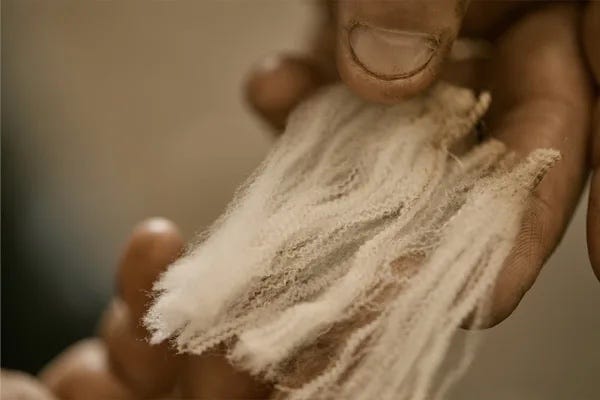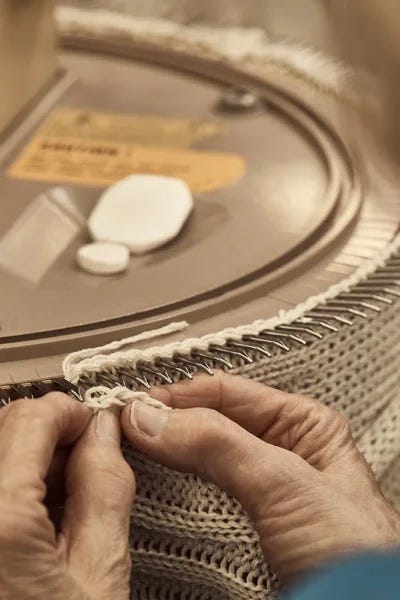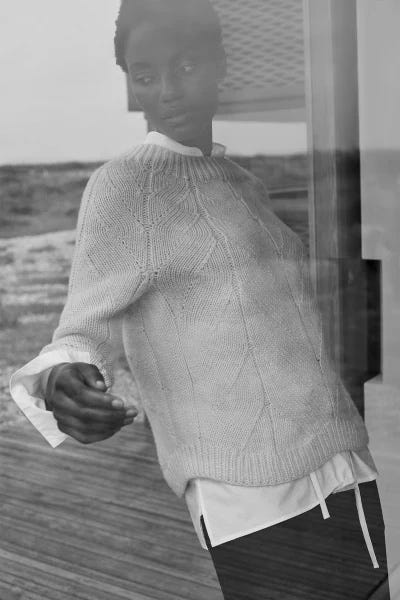Since we first began creating clothing, we have relied on the natural durability and breathability of one miracle fibre: wool.
WHY DO WE USE WOOL?
Wool is a resilient, high quality fibre that will last for years whilst maintaining its appearance. We love the look, texture and versatility of wool along with its renewable properties; since sheep fleece grows all year round, after shearing in the spring seasons they begin a new cycle of growth. What's more, due to its naturally high percentage of nitrogen, wool will naturally biodegrade within a single year, enriching the soil it is planted in and nourishing new life.
HOW DO WE USE WOOL?
Our wool items come in many forms. We choose to use wool in its unique undyed form, utilising the light and dark fibre of the sheep, and work to ensure all of our wool is responsibly sourced from reputable spinners who have sustainability and animal welfare at the heart of their supply chain. Right now, we are pioneering the future of British knitwear as we pilot our own Homegrown Merino wool, grown right here in the UK at Daylesford Organic farm.
Bamford wool glossary


OUR PROGRESS
Our sustainably sourced wool is certified via Responsible Wool Standard (RWS), Fibreshed, or Woolmark, which can each be traced right back to the farm. We have achieved total traceability for 46% of our wool fibres for the Autumn-Winter 21 collection - a +21% increase since 2020. While we still have progress to make, this is a number we are committed to growing with each collection we design. Read on to learn about the varieties of natural wool in our collection.
RESPONSIBLE WOOL STANDARD
The Responsible Wool Standard (RWS) is a voluntary standard that addresses the welfare of sheep and the land they graze on. It ensures farmers have a progressive approach to managing their land, and are consistently practicing respect and holistic care for their animals’ welfare. In total, 27% of the wool used in our 2021 collections is RWS certified; a further ¼ of the wool we have sourced is non-mulesed and supporting mills who are transitioning to RWS in the next few years.
By using RWS wool we are ensuring good health and animal-husbandry is at the core of the farmers approach where we source wool for our collections. RWS addresses the environmental impacts of overgrazing, which, in the worst-case scenarios, leads to bare ground, erosion and soil desertification. On the contrary, RWS requires farmers maintain soil health, protect biodiversity and promote native species. We are proud to be working with some of the most forward-thinking farmers who take a holistic farmer-led approach to sustainable land and animal management.
WOOLMARK
The Woolmark standard represents a commitment between woolgrowers, brands and consumers on the authenticity and quality of the fibre that connects us - whether we grow, design with or wear this versatile fibre. Connected by the common thread of Australian wool, Woolmark work to create positive change through open and honest conversations across the entire supply chain, providing brands and consumers with assurance on the responsible production of wool.
UNDYED
Undyed yarn leaves no trace: it is not exposed to any chemical treatments or artificial colours which reduces its water and energy consumption and also makes it exceptionally soft for the wearer. The science tells us that this increased presence of undyed fibres supports our commitment to treading lightly. According to our Dyeing House, approximately 200 litres of water are used to dye 1kg of yarn using standard dyes - it follows that with undyed yarns, we save 200 litres of water for every 1kg of undyed yarn used.
Championing British wool


The UK wool industry has been decimated, with just 1 in 5 UK farmers making a profit from producing woolen fleece if you were to remove subsidies. We are emphatically aligned with farmers and mills in the UK who share our commitment to revitalising this heritage industry, bringing back value for farmers and for UK sheepswool.
In September 2021, we hosted a panel conversation with three experts on British wool to learn more about the future of this industry. Watch the conversation below or on our YouTube channel.
THREE FACTS ABOUT BRITISH WOOL
The market for UK wool significantly dropped in the twentieth century as the demand for synthetic fibres increased as a cheaper alternative to natural wool fibres. Initiatives such as North West England Fibreshed have been established to reinvigorate the UK wool industry, growing and producing wool fibres from field-to-fibre within 150 miles of the source.
There is the common misconception that merino sheep originate from Australia and New Zealand. In fact, the Saxon merino breed we are farming at Daylesford Organic in Gloucestershire was farmed by the Saxons hundreds of years ago in Northern Europe and England. It wasn't until the 19th Century when the first merino sheep were shipped over to Australia from the UK, and the breed slowly became acclimatised to this new environment.
The average supply chain of merino wool sourced from Australia or New Zealand is 18,000 miles. In comparison, our Homegrown Merino wool sourced from Daylesford farm in Gloucestershire travels only 400 miles 'from sheep to shop'.
THREE WORDS TO KNOW:
Biodiversity
'It means the natural variability of animals and plants found in one area - a country, a planet, a habitat, wherever. There is a lot more biodiversity here than just us (humans) in the room, and that it something we need to be aware of.' - Lesley Prior
A fibreshed
'A geographical designation that defines and gives borders to a natural texture resource: local fibres, local dyes, local people. The challenge that we face to produce a garment all the way from the soil to the finished garment within a 150 mile radius, which with wool is a huge opportunity for this country.' - Ruth Rands
Regenerative
'Putting back what you take away from the soil - not just sustaining, but actually improving, and farming with the soil's biodiversity in mind. I think that is the future.' - Julia Knight
BRITISH BLUEFACED LEICESTER WOOL
Our Bramble Hand Knit for the Autumn-Winter 21 collection uses 100% fine English wool. This garment champions responsible local farming practices, using wool grown by Bluefaced Leicester Sheep which yield the finest fleece of any heritage sheep in England. Native to the North West England, they live very comfortably in this climate and produce a very high quality wool.


